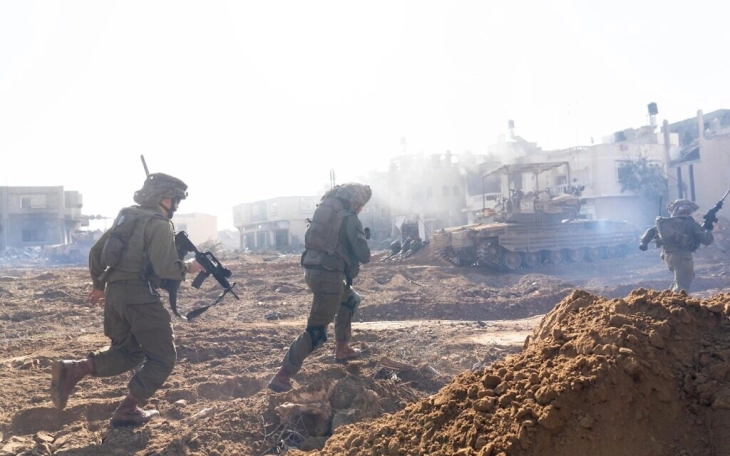Heavy fighting rages in Khan Younis as UN experts fear 'catastrophe'
- Israel's army reported on Friday that intensive fighting continues in the southern city of Khan Younis in the Gaza Strip as soldiers attacked dozens of targets of the Palestinian Islamist organization Hamas.
- Post By Angel Dimoski
- 10:38, 27 January, 2024

Gaza, 27 January 2024 (dpa/MIA) - Israel's army reported on Friday that intensive fighting continues in the southern city of Khan Younis in the Gaza Strip as soldiers attacked dozens of targets of the Palestinian Islamist organization Hamas.
The battles raged on the day the International Court of Justice in The Hague ruled that Israel risked genocide in its war on Gaza, but stopped short of ordering an immediate cessation. The Hamas-controlled Health Ministry says over 26,000 Gazans have been killed by the Israeli military in the four-month war. The UN regards the Palestinian casualty figures as credible.
The Israeli army said in a statement: "Terrorists were killed by the troops during fighting in the area."
The military said it also again attacked Hamas infrastructure in the north of the coastal strip.
According to eyewitnesses, thousands of people fled Khan Younis due to the fierce fighting. The largest city in the south of the Gaza Strip is considered a Hamas stronghold by the Israeli military.
A mass exodus from the embattled city to the border town of Rafah in the southern Gaza Strip could have devastating consequences for the civilian population, according to a UN human rights expert.
"If you have people moving in large numbers from Khan Younis and other places, this is going to be a massive catastrophe," said Ajith Sunghay, head of the United Nations Office of the High Commissioner for Human Rights, Occupied Palestinian Territory (OHCHR).
"There can be a civil disorder, a breakdown of any kind of civil order."
The city on the border with Egypt is already home to more than 1.3 million of the 2.2 million inhabitants of the Gaza Strip, Sunghay said.
The situation there is already very tense due to the masses of internally displaced people and a lack of food, he said in a UN video.
Israel believes senior Hamas officials are hiding in tunnels in Khan Younis and that militants are keeping Israeli hostages in the extensive underground network, too.
The Palestinian Red Crescent reported on Thursday that Israeli units had bombed and shelled the area around the al-Amal hospital. Rescue workers and people seeking help could no longer reach it.
The Israeli military announced that it was in contact with the medical staff of the Nasser and al-Amal hospitals in Khan Younis to ensure their continued operation.
According to the UN, some 18,000 internally displaced people have sought refuge in the Nasser hospital alone. However, according to the Israeli army, many people have voluntarily decided to leave the hospitals via an escape corridor.
The head of the World Health Organization (WHO) has warned that Khan Younis's Nasser Hospitalis on the brink of collapse.
The hospital was running out of fuel, food and supplies, wrote Tedros Adhanom Ghebreyesus overnight on Friday night on the online platform X, formerly Twitter.
Hundreds of patients and hospital staff had fled because of the fighting and the delivery of supplies was "difficult." According to Ghebreyesus, there are currently 350 patients and 5,000 displaced people in the hospital.
The aid organisation Médecins Sans Frontières announced that essential medical care at Nasser Hospital had collapsed.
"These systematic attacks against health care are unacceptable and must end now so that the wounded can get the care they need. The entire health system has been rendered inoperative," MSF said in a press release.
The hospital is the largest health facility in the Gaza Strip which was still functioning.
Israel's military rejected reports of sieges or attacks on the two hospitals as "blatant misinformation." The army has said that there are indications that Hamas is using both hospitals for its own purposes.
Israel launched its invasion of Gaza in retaliation to the massacre carried out by Hamas militants and other Palestinian extremist groups in Israel on October 7. Over 1,200 people, including hundreds of civilians, were killed inside Israel and more than 200 were taken hostage.
CIA Director Bill Burns will reportedly travel to Europe in the coming days to negotiate the release of the Israeli hostages still being held by Hamas.
Talks about the release of hostages have recently picked up fresh momentum.
However, an Israeli government spokesman this week rejected as "ludicrous" a Hamas proposal to release detained Palestinian perpetrators of the worst atrocities on October 7 in any hostage deal.
With the help of Qatar, Egypt and the United States, a one-week ceasefire was agreed at the end of November. During this period, Hamas released 105 hostages in several stages. In return, Israel released 240 Palestinian detainees from its prisons.
The risk of the war spreading to two fronts was outlined by Israeli Defence Minister Yoav Gallant, who accused Lebanese Hezbollah militants of fuelling tensions on the border between the two countries.
The Iranian-backed militia is refusing to withdraw its fighters from the border area, Gallant said in a conversation with US Defence Secretary Lloyd Austin on Friday, according to Gallant's office.
At least four pro-Iranian Hezbollah militants were killed late Friday and three other people were wounded when Israeli warplanes struck a house in southern Lebanon, a Lebanese security and Hezbollah sources said.
The Israeli airstrike came after Hezbollah claimed two missile attacks against Israeli posts near the Lebanese border.
According to Lebanese security sources the house which was targeted was in the village in Beit Leif in southern Lebanon.
The sources added that Israeli artillery also hit a cluster of Lebanese villages close to its border.
Meanwhile, residents of the Lebanese southern village of Ghandouriyeh said they received messages on their phones from the Israeli army calling on them to leave their homes as the army will shell some areas inside the village.







